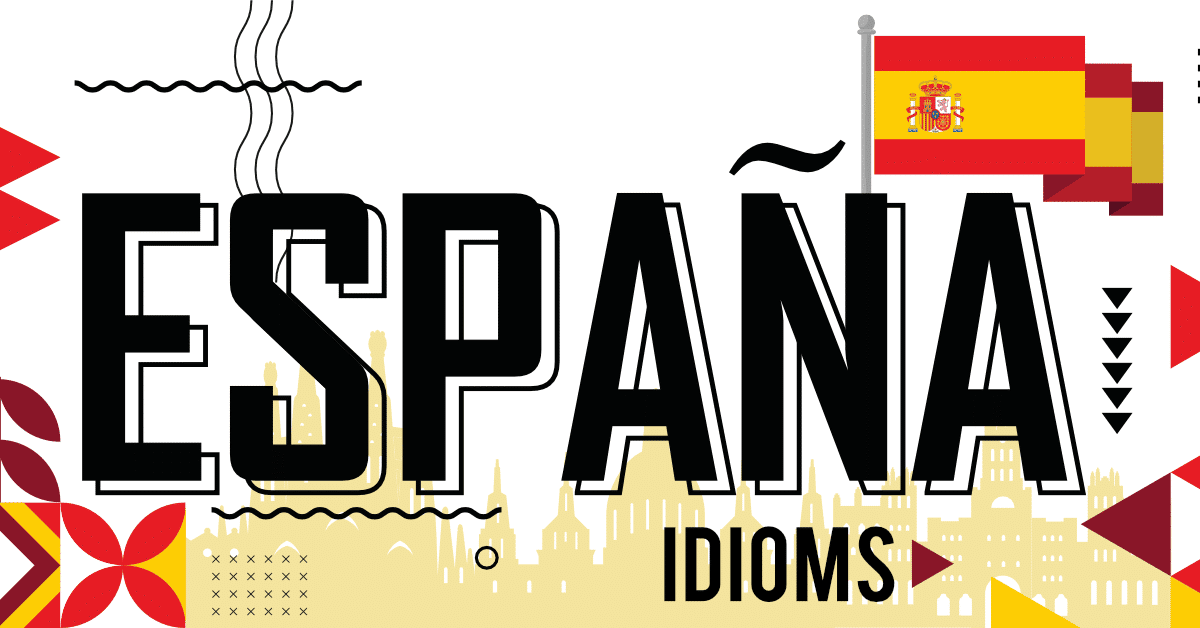If you want to improve your Spanish skills, idioms are a must to truly understand the language. And not only that, they also help you understand and learn more about the country. As there are some idioms with some history behind them.
Spain is one of those countries that has a lot of interesting idioms for many different occasions. And people use them on an everyday basis. That’s why you should learn at least these next 15 European Spanish idioms.
They’ll make your life easier whether you’re planning a trip to Spain or want to speak like a native. You’ll go through the streets of Spain impressing locals with your knowledge of their language and culture.
15 European Spanish Idioms
1. Es la leche
Literally, it means “it’s the milk”. But, in reality, it’s used to say that something is extraordinary. And it can be for good or for bad. For example: if you help your friend pass an exam, he/she could tell you: ¡Eres la leche! (you’re the milk!).
And prepare, because in Spain people have many different expressions using the word leche (milk).
2. ¡Ni de coña!
This is used to say “no!” in a very strong way. It’s like saying “not in a million years!”. For example: if you’re scared of heights, and your friend challenges you to jump in a parachute, you could say: ¡ni de coña!
3. Estar cachas / Ser un/una cachas
It means to be strong and muscular/well-built. For example:
Voy al gimnasio, porque quiero estar cachas. (I’m going to the gym because I want to be muscular.)
4. Va a misa
Literally this means “he/she/it goes to mass”. It’s used to say that something is completely true, and you can’t refute it. It’s an absolute truth. For example: lo que el maestro dice va a misa. (what the teacher says is an absolute truth.)
5. Se te ve el plumero
Literally it could be read as: “your duster is showing”. But, in fact, it has nothing to do with a duster. It actually means that you can see somebody’s true intentions.
6. Quien se fue a Sevilla, perdió su silla
Literally, it says: “Whoever went to Sevilla lost his/her chair”. It actually means that you should take care of what’s yours or somebody else will take it. Whether that’s a chair, an object, or an opportunity, don’t leave it for a second or you lose it to someone else.
This idiom has a lot of history behind it. When Enrique IV was king of Castile (Castilla in Spanish), Alonso de Fonseca was the archbishop of Seville (Sevilla in Spanish). And his nephew had just become archbishop of Santiago de Compostela. But things in Santiago de Compostela were a little chaotic, so Alonso’s nephew asked his uncle for help.
They made a deal that Alonso de Fonseca was going to be in Santiago de Compostela to fix everything, and his nephew would stay on as the archbishop of Seville until the return of his uncle. But when he returned to Seville, his nephew wouldn’t give him the archbishopric of Seville back. So, the king and the pope had to intervene.
Now you know why this idiom means what it means.
Mexico adopted this idiom and put their own twist on it: they changed Sevilla to Villa.
7. Hacer pellas
Have you ever skipped school? If the answer is yes, you might as well use this idiom since hacer pellas means to skip school.
But this is only just one way to refer to skipping school. Depending on the Spanish region, there are many other phrases to express that. Some common ones are: hacer novillos, pirar clase, fugarse, fumarse las clases, among many others.
8. Se me va el santo al cielo
It means that you forgot about something. Maybe it was something you had to do or what you were saying. For example: when you tell a story and forget what you were about to say.
Or when you start talking about something completely different from the main topic, and forget what you were talking about in the first place.
9. Ser un pelota
Literally, it means “to be a ball”. But it’s used to say that someone is constantly flattering or trying to please someone just to get a benefit from them.
For example, let’s say your boss announces that someone will get a raise soon, and suddenly your coworker starts giving him/her compliments. You can tell your coworker: eres un pelota.
10. ¡Leches!
This means: “milks!”. It’s an interjection used to express shock, frustration, or surprise. The word “milks” might seem like a weird option to express your emotions, but it’s a very common one in Spain.
11. Irse por los cerros de Úbeda
This means “to go through the hills of Úbeda”. This is used when someone digresses when talking about something.
It comes from a soldier that disappeared when a battle in 1234 in the city of Úbeda was about to start. When the battle was over, he returned and said that he got lost in the hills of Úbeda.
A fun fact is that Úbeda is a UNESCO World Heritage Site. So next time you go to Spain, you might want to visit this city full of history.
12. Dar caña
Caña means “cane”, and in a literal way this phrase says: “give cane”. But Spanish people use this idiom to mean that they’re working very hard on something, putting in all their effort.
For example: Dale caña a la gimnasia para que logres ir a los Olímpicos. (Put all your effort into gymnastics so you can go to the Olympics.)
13. Comerse el coco
Literally this means “to eat the coconut”. But Spanish people use it as a way of saying they’re overthinking something.
14. Darse una leche
This means “to give yourself a milk”. But once again, milk shouldn’t be translated literally in this phrase. What Spanish people mean with this idiom is that somebody hit himself/herself by accident.
15. Estar en el quinto pino
It means that something is very far away.
Start Using Your New Spanish Idioms in a Conversation
If you really want to master these idioms, the best thing is for you to start using them. You can practice with your Spanish-speaking friends or neighbors. That way you’ll impress them, or they can tell you if you’re using them correctly. You can also use them during TruFluency Spanish classes.
Or teachers are native speakers, so they’ll know if you’re using them right. If you are, they’ll be proud, and they can maybe even teach you more. If you’re not, our classes are a safe environment to make mistakes and learn from them, so don’t worry.
In our lessons, you’ll also learn other useful Spanish vocabulary. So you know more words to express yourself with. And, you’ll speak in every lesson! That’s the only way you’ll get fluent in Spanish. And that’s our main goal, for you to achieve language fluency, so you can hold full conversations with native speakers.
We know that everyone has different life schedules and locations. That’s why TruFluency classes are completely online to fit your schedule. So, you can study with us no matter where you live or are.
Choose your own schedule and get started start now or sign up for our 2 hour trial classes for only $49.





